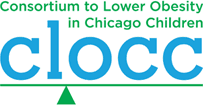On January 8, 2013, CLOCC released the Blueprint for Accelerating Progress in Childhood Obesity Prevention in Chicago: The Next Decade. Each year, CLOCC invites our partners to weigh in, via survey, on their progress along the path set forth by the Blueprint. In coming months. CLOCC will feature these partners in this space, as well as on social media. For more information, contact info@clocc.net.
We had the recent opportunity to speak with Brighton Park Neighborhood Council (BPNC) Director of Organizing, Mariela Estrada, who was happy to tell us about the work BPNC is doing to train and support community health workers. These individuals provide culturally and linguistically appropriate community and in-home education integrating obesity prevention education into their services. Specifically related to the Blueprint, we learned about BPNC’s progress in the areas of Health Promotion, Physical Activity/Built Environment and Food Access.
Through a partnership with CLOCC, BPNC started training health promoters to perform walkability assessments, provide nutrition education and disseminate information to the community regarding the role of the built environment in the obesity epidemic. BPNC believes that training health workers on obesity prevention education is vital to improving overall community health and that providing obesity prevention education at schools is directly aligned with its mission to provide youth services.
BPNC’s School-based Parent Health Promoter Program has parent leaders at four local schools developing family health education programs, family fitness programs and health and nutrition programs. The fitness programs offer popular classes such as Zumba and yoga at a low cost. These programs provide a venue for health communication through parent and student engagement. BPNC’s Parent Patrol program also encourages physical activity; parents volunteer at schools during entry and dismissal times so that those who want to walk feel safe enough to do so. Much of BPNC’s work in this area serves the Blueprint’s goal to “Create, expand, or improve community environments where children can be physically active,” supporting street/sidewalk environmental change approaches.
Through its Health Promoter program, BPNC trains community leaders about making healthy choices and how to disseminate that information to the community. Health Promoters learn about nutrition, mental health and maintaining a healthy lifestyle. Training is provided on heart health, chronic disease and general obesity trends. Health documentaries such as Weight of the Nation and others are also utilized during training sessions.
Much of BPNC’s work serves to address the Health Promotion goals of the Blueprint Specifically, goal 3.1, which states “Provide programming to build health literacy, knowledge, and skills around healthy eating and physical activity in communities experiencing high levels of obesity.” In order to expand nutrition education, BPNC Health Promoters were trained to implement education with sensitivity to community culture. Additionally, a local chef provided a cooking demonstration that included a culturally-competent, healthy preparation of a Thanksgiving turkey.
The first round of nutrition education trainings, funded by CLOCC, introduced the MyPlate guidelines. One of the tactics included in the Blueprint is to provide education about preparing nutritious meals on a limited budget for families experiencing food insecurity. Those who attended the class were eligible to participate in a grocery store challenge, where participants on a grocery tour were challenged to spend just $5 and purchase healthy ingredients that would create a meal for a family of four. Health Promoters emphasized tips such as looking for nutritious items on sale, avoiding shopping while hungry and also clarified misconceptions regarding the differences in canned, frozen and fresh food. The second round of trainings was coordinated through the UIC School of Public Health; the trainings took place twice a week for eight weeks and were provided free of charge through free resources and volunteer speakers.
BPNC identified its main community health objectives as implementing 5-4-3-2-1 Go! ® through work with CLOCC, (improving nutrition, increasing physical activity and decreasing screen time), performing health assessments and improving access to health care.
BPNC’s Health Promoters are very engaged in Council activities and are essential in keeping community residents informed of upcoming events. They utilize fliers, word of mouth, local newspapers, school bulletins and school calendars. BPNC is satisfied with the level of community engagement and attendance at their events; over 300 people attended a recent health fair.
The Council reports seeing changes in the community such as increased parent awareness regarding healthy food consumption and the importance of physical activity. These changes are indicated by community residents through self-evaluations conducted once a year, as well as anecdotal evidence on making lifestyle changes at home and engaging kids in after school activities.
Moving forward, BPNC has set a goal to decrease obesity in the community by 3 percent in the next 10 years. The Council is working to secure resources to expand its obesity prevention education, especially nutrition education classes for young people and providing popular fitness classes at low cost to encourage physical activity. Additionally, the health subcommittee in the Brighton Park coalition continues to focus on linking residents to health care providers and health education resources that would be otherwise unavailable or unaffordable.


